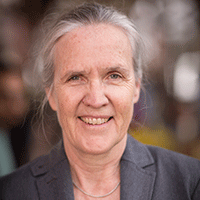Ammerman’s project, Good Bowls, offers recipe for health equity
June 15, 2018
Social determinants, including income and place of residence, can determine how healthy a person is in the present and over time, but a new initiative called Good Bowls aims to level the playing field and provide better health for many.
Alice Ammerman, DrPH, Mildred Kaufman Distinguished Professor of nutrition at the UNC Gillings School of Global Public Health and director of UNC’s Center for Health Promotion and Disease Prevention, leads the new public health initiative, which was launched June 9.
Through careful research and development, Ammerman and her team of current and former students have created a product—Good Bowls—that aims to provide better access to nutritionally valuable food for lower-income consumers, while creating economic opportunities for local farmers and food entrepreneurs. The bowls contain healthful, locally sourced foods that are frozen for longer shelf life.
Ammerman hopes the project will enhance the environmental, economic and social well-being in communities in the southeastern United States.
Food insecurity is prevalent in many North Carolina communities. Busy schedules, multiple jobs, family demands and financial limitations make it difficult for people to prepare nutritious food quickly and economically, often forcing people to sacrifice healthy options for more convenient ones. While programs such as the Supplemental Nutrition Assistance Program (SNAP, formerly “food stamps”) help defray the cost of food for low-income consumers, access to healthy food often remains limited. Food products typically offered at the local convenience store are often highly processed and of limited nutritional value.
“Many North Carolinians lack consistent, dependable access to affordable and appealing food for healthy living,” Ammerman said. “Our state ranks among the highest in the country for chronic disease, such as heart disease, diabetes and obesity, associated with poor nutrition. We know that many cases of chronic disease are preventable or treatable with proper nutrition, and we hope that Good Bowls will be a tool to help get better food to more people.”
Funded for a pilot study by the 2016 Felix Harvey Award, Good Bowls are designed for sale at two price points – the higher, in premium food stores frequented by higher-income consumers (e.g., Weaver Street Market or the Durham Food Coop, in the Chapel Hill, N.C., area), and the lower, in convenience stores, which tend to be frequented by lower-income consumers for daily food needs, particularly in “food deserts.”
Ammerman and her team are working diligently to bring Good Bowls to stores throughout the state.
As a frozen product, Good Bowls are eligible for purchase with SNAP, and therefore can help reduce food expenses for lower-income consumers. Good Bowls products also have much longer shelf life than fresh foods, incentivizing convenience stores to carry them, as less waste will help the stores maintain their (often slim) profit margins.
The product also will be attractive to higher-income, health-conscious consumers, who will find locally sourced, nutritious, delicious and convenient meal options for themselves and their families.
Good Bowls also provide an opportunity for altruistic consumers to benefit the local community. By purchasing Good Bowls products at a higher price point, buyers can support local food entrepreneurs and growers. This unique business model uses an adaptation of the “buy one, give one” model and takes a social justice approach to providing the same nutritious, premium product to lower-income members of the community, at prices that fit the consumer’s financial needs. Good Bowls are available to any individual or family seeking a healthy and convenient food option, regardless of income and access disparities.
The Good Bowls business model eventually will include a collaborative network of partners, linking local farmers with commercial kitchens and different retail markets to generate a sustainable, community-based product. Southeastern farmers, especially in rural and economically distressed communities, face many challenges and often need to identify new market opportunities.
Good Bowls helps in two ways.
The initiative uses produce from local farmers, including cosmetically challenged or excess produce that otherwise would go to waste. The project team also intends to engage with value-added processing facilities (VAPFs) and certified community kitchens, which often are under-utilized in the community. To stimulate business for facility owners and keep product costs low, Good Bowls will be produced in certified community kitchens or VAPFs linked with local producers. A local woman-owned start-up business, Food Insight Group will coordinate recipe development, labeling, packaging, marketing materials and food safety oversight.
Ammerman said that Good Bowls makes healthy eating both convenient and culturally exciting. She and her partners at Food Insight Group are advancing southern food culture by developing frozen food recipes at the nexus of Mediterranean diet-inspired nutrition and traditional Southern cuisine. For example, Good Bowls integrate southern staples such as collard greens, sweet potatoes, peppers, corn and beans. However, the food is prepared in tasty and innovative ways, consistent with the healthful Mediterranean diet.
Ammerman said she believes the entrepreneurial project will open opportunity for community partnerships and mutually beneficial business relations and will cultivate an environment for accessible and affordable food.
“We hope that Good Bowls will promote good health for individuals, the community and the planet, and ultimately help close the health disparity gap,” she said.
Ammerman’s team includes Kati Schy and Sebastian Elie-York, interns in the public health track of the UNC entrepreneurship minor, nutrition students at various levels of training, and two Gillings School nutrition alumni, Linden Thayer, PhD, and Beth Hopping, PhD, co-founders and co-directors of the Food Insight Group.
Learn more on Facebook and Instagram.
A version of this article, reported by Kati Schy, appeared first on the HPDP website.
Conflict of Interest Disclosure: Dr. Alice Ammerman, director of the UNC Center for Health Promotion and Disease Prevention, founded and has equity ownership in Equiti Foods, LLC (formerly Good Bowls, LLC). This relationship has been disclosed to and is under management by UNC-Chapel Hill.
Contact the Gillings School of Global Public Health communications team at sphcomm@listserv.unc.edu.


